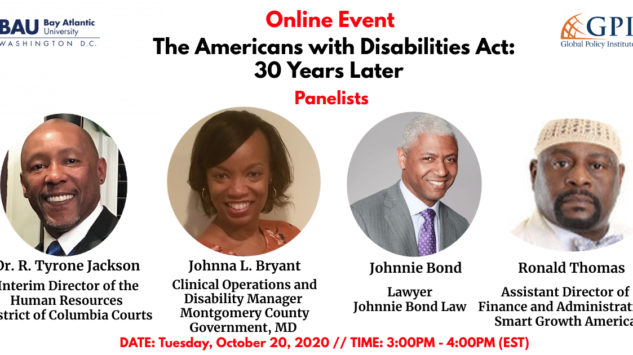Events

The Americans with Disabilities Act (ADA) was passed in 1990 with a similar purpose to the Civil Rights Act of 1964. However, this expanded protections to those with a disability. In addition, it required accessibility for public buildings and for employers, educational institutes, etc. in providing reasonable accommodations. Generally perceived as a positive contribution towards equality, has its legacy been completely positive for the last 30 years? Also, what will the next 30 years look like?
To shed light on these pressing issues, BAU and GPI have assembled highly qualified experts on Tuesday October 20, 2020, at 3:00pm (EST) for a webinar titled:
“The Americans with Disabilities Act, 30 Years Later”
Event Recording:
Event Summary:
Tyler Cargill opened the panel by giving a brief history of the Americans with Disabilities Act of 1900 (ADA). The first question, what does the impact of the ADA mean to them¸ was directed question towards Dr. Jackson. Dr. Jackson started by stating how it transformed the workplace and expanded on how an ADA coordinator at the workplace has “shifted the mindset of HR” in dealing with employees. Johnna Bryant agreed with him, especially when it concerns the current employer who needs accreditation. She then expanded upon the need to breakdown stereotypes. Ronald Thomas then gave the example of how he is working with the Washington, D.C. Board of Elections in making sure that they are in ADA appliance and, in the long run, “gets people to understand the importance in having a voice.”
The second question, regarding the struggle in creating tolerance and acceptance of those who do have a disability and/or want to register for accommodations, was answered by Johnna Bryant who stressed that in the discussion of diversity and inclusion, we must include disabilities. Dr. Jackson agreed and spoke about the training session from the Board of Elections where they showed films regarding interacting with individuals. He then expanded and stated how mindfulness towards those with disabilities is crucial.
Mr. Thomas started the third question, how to have and keep mindfulness, by stressing to make sure how people want to be addressed. Johnnie Bond commented on how you should put yourself in their viewpoints. Also, about asking the individual questions, including how they feel. Dr. Jackson then stated that “we need to research, and step out and say, ‘this is a person and [we] need to respect their space,” which may include not knowing how to approach in helping.
Mr. Bond was then directed a question by Mx. Cargill regarding what the future of the ADA looks like. He started by stressing that it becomes a common part of the workplace. Ms. Bryant then commented on how it should be fully integrated in the Civil Rights Act.
The panel ended with a question and answer portion.
After Armstrong Allen, Bond moved to Washington, DC to focus his entire career on his passion to become one of America’s top trial lawyers.
Johnna currently is the Subject Matter Expert (SME) in all things ADA and FMLA for Montgomery County Government employees. Her career experience includes policy development and project management in Human Resources, Training and Education, Leave Management, Reasonable Accommodations evaluations, Federal & State employment regulations in the private and public sectors. Johnna is certified as a training instructor by the State of Maryland in Labor Negotiation, Mediations and Conflict Resolution Facilitation.